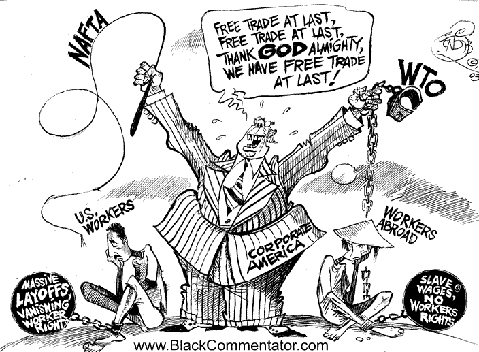 Although Wayne Ellwood considers the transatlantic journey of Christopher Columbus the initiation of globalization, it’s true origins may lie even deeper in human history, dating all the way back to the origins of humanity in Africa, and their subsequent journeys to other continents. Though technology at the time prevented these early humans from creating vast networks of commerce and information exchange, it does show a desire by humans to explore and seek resources. This resource-seeking is exactly what led to our modern globalization, as individuals and companies seek to take advantage of nations’ unique characteristics and resources to improve economic efficiency.
Although Wayne Ellwood considers the transatlantic journey of Christopher Columbus the initiation of globalization, it’s true origins may lie even deeper in human history, dating all the way back to the origins of humanity in Africa, and their subsequent journeys to other continents. Though technology at the time prevented these early humans from creating vast networks of commerce and information exchange, it does show a desire by humans to explore and seek resources. This resource-seeking is exactly what led to our modern globalization, as individuals and companies seek to take advantage of nations’ unique characteristics and resources to improve economic efficiency.
The efforts of globalization to connect nations in a free, global economy has led to many disruptions and changes in countless societies, perhaps even every society. Outsourcing hurts the top economic nations but provides cheaper products, while an influx of jobs helps the poorest nations but also creates harrowing work conditions and has potentially harmful effects on the local environment. Countries in the middle of the scale benefit and are negatively affected by all of the above consequences of globalization.
However, these benefits and problems do not arise out of just globalization, rather globalization, especially today in our easily connected world, magnifies existing inequalities between nations. Growing up, I never thought we’d have a trade deficit with Mexico, but the vast difference between the two countries was immensely utilized by American companies to produce vast amounts of goods cheaply. Is it even really a trade deficit if much of the production is by or funded by American owned and based corporations?
This inequality also arises in the rationale behind globalization and the reality of the economic integration. While, I wholeheartedly agree that free economic trade between nations will lead to benefits for all nations, the current globalization strategy does not promote free trade, but rather institutes pseudo-free economies with control shifting out of individual nation’s hands and towards global organizations with the interests of the most prosperous nations as a priority.
As Ellwood points out, global markets are not free but rather are influenced by corporate interests. For example, the governments of the “Tiger Economies” desired to maintain control over their economies, but the International Monetary Fund repeatedly insisted that the they free their economies. Eventually, the Asian governments complied, and a few years later went through a financial crisis that sent shock-waves around the world. This sort of persuasion by large organizations goes against the very principles of freedom of nations from outside influences (who have purely their own interests in mind). The IMF and World Bank and other globalization promoting organizations do not allow for freedom to reign, but rather promote their ideals onto other countries. Many third world nations, thirsty for capital seek funds from the World Bank, but have to accept such stringent requirements and restrictions that these funds end up perpetuating their poor economies, rather than helping them grow out of them.
As noted in Multinational Corporations and Government Relationships, free trade is promoted as the ideal market, until a prosperous nation’s key industries are attacked by foreign competitors. At this point the governments institute tariffs and import quotas to protect their industries, while hampering free trade. Even today, America promotes the benefits of free trade but refuses to perform any exchanges with Cuba, who have a supreme competitive advantage in rolling the finest cigars on the planet.
Although it would at first prove harmful to prosperous nations, the best strategy to properly implement global free trade, would be to actually implement global free trade. Removing tariffs, quotas, embargoes, and other restrictions to free trade would allow each country to utilize it’s natural resources and focusing on creating the best products for the world, without worries that they will be unable to obtain required goods in exchange.
Our current system simply does not follow what is written on paper, and instead prosperous nations utilize their vast resources to maintain advantages, thus limiting the benefits they and other countries can receive from globalization. In the grand scheme of the universe, our earth is not as large as we make it out to be, and for all nations to survive in the future, we will have to rely on trust and freedom to reign across all nations, without restrictions.
Umass – Amherst – SCH-MGMT – 365 Business and Its Environment
Summer 2007 Discussion #15
Assigned Readings:
Ellwood, Wayne. The No-Nonsense Guide to Globalization London: Verso, 2001.
Steiner, George A. and John F. Steiner. Business, Government and Society: A Managerial Perspective 9th ed. McGraw-Hill/Irwin, 2000 [Note, linked version is to 2005, 11th edition].
